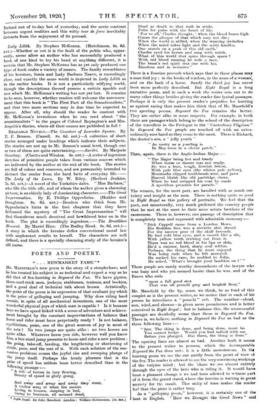Lady Lilith. By Stephen McKenna. (Hutchinson. Ss. 6d. net.)—Whether or
not it is the fault of the public who, appar- ently, never allow an author who has successfully produced a book of one kind to try his hand at anything different, it is certain that Mr. Stephen McKenna has as yet only produced one type of book under a variety of names. The family resemblance of his heroines, Sonia and Lady Barbara Neave, is exceedingly close, and exactly the same world is depicted in Lady Lilith as in the earlier books. It is not a particularly edifying world, though the descriptions thereof possess a certain sparkle and rest which Mr. MeKerma's writing has not yet lost. It remains to be seen, however, whether readers will welcome the announce- ment that this book is "The First Part of the Sensationalists," and that two more sections may in due time be expected to appear. After all, why should the reader be content with Mr. McKenna's inventions when he can read about "the sensationalists" in the pages of Colonel Repington's and Mrs. Asquith's diaries, where all their names are published in full ? READABLE NOVELS.—The CO16764488 of Lowndes Square. By E. F. Benson. (Cassell. Ss. 6d. net.)—A colleetion of short stories arranged under headings which indicate their subjects. The stories are not up to Mr. Benson's usual level, though one or two of them are quite entertaining.--Savitri. By Marjorie Strachey. (Chatto and Windus. 6s. net.)—A series of ingenious sketches of primitive people taken from various sources which are indicated by the author at the end of the book. The stories are full of colour and romance, and are presumably intended to distract the reader from the hard facts of everyday life.— The Lady of the Lawn. By W. Riley. (Herbert Jenkins. 7s. 6d. net.)—,A novel of the Yorkshire dales. "Miss Barbara," who fills the title relic, and of whom the author gives a charming Picture, is an elderly lady of dominating character.—The Great Impersonation. By E. Phillips Oppenheim. (Hodder and Stoughton. Ss. 6d. net.)—Readers who think from Mr. Oppcnheim's hints in the first chapters that they have fathomed the mystery of "The Great Impersonation" will find themsleves much deceived and bewildered later on in the
book. The plot is exceedingly ingenious. The Breathless Moment. By Muriel Hine. (The Bodley Head. Ss. 6d. net.)— A story in which the heroine defies conventional moral law with unpleasant results to herself. The characters are well defined, and there is a specially charming study of the heroine's old nurse.


































 Previous page
Previous page